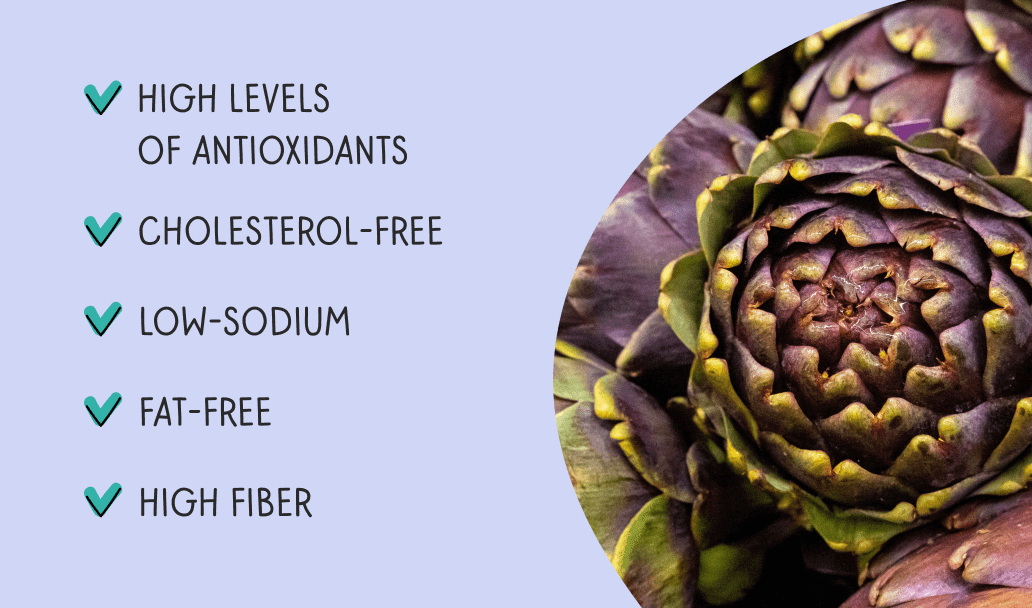Pretty sure you saw artichokes at the grocery, and every time you looked at them with suspicion: Should I try? Are they tasty? Do they have some benefits? The answer is yes! We will describe all the advantages of this superfood. Attention: at the end of the article, there is a tasty secret on how to cook artichokes in the most healthy way.
Artichokes are very healthy and nutritious; they are considered one of the most antioxidant-rich plant types. They also contain vitamins C and K, which protect your cells against the effects of free radicals and help with blood clotting. In the composition of artichokes, you can find some essential minerals: phosphorus, magnesium, potassium, and iron.
Eat tasty food and lose weight with Unimeal app!
Take a Quiz – Get personal meal plan – Achieve your weight goals!
Start Quiz
Here are the nutrients for one boiled and drained artichoke per 100 g:
Equally important, these thistles are cholesterol and fat-free, low-sodium, and high in fiber.
Artichokes have a lot of potential medicinal properties, so eating them can improve your health. This plant can be cooked or consulted as a food supplement: both provide health benefits for your body.
Artichokes are high in fiber, contributing to healthy gut bacteria growth. One study showed an increased level of good intestinal bacteria for people who daily contain artichoke extract for three weeks1Ramirez-Farias C, Slezak K, Fuller Z, Duncan A, Holtrop G, Louis P. February 2014. Effect of inulin on the human gut microbiota: stimulation of Bifidobacterium adolescentis and Faecalibacterium prausnitzii. Br J Nutr. DOI:10.1017/S0007114508019880. Another research proved that artichoke leaf extract daily for six weeks reduced symptoms, such as flatulence and uncomfortable feelings of fullness2Kirchhoff R, Beckers C, Kirchhoff GM, Trinczek-Gärtner H, Petrowicz O, Reimann HJ. Septembre 1994. Increase in choleresis by means of artichoke extract. Phytomedicine. DOI:10.1016/S0944-7113(11)80027-9.

Firstly, you can eat them and not be afraid to get fat because artichokes are low-calorie and fat-free: 100 g of artichokes contain only 53 kcal. Additionally, they have diuretic effects that eliminate toxic waste accumulated and thus contribute to weight reduction.
The consumption of artichokes helps to saturate your body with vitamin C, which increases immunity. Adding them to the meals in the process of cooking, you thereby significantly increase the protective properties of your body, maintain good health, and, as a result, you are sick less often.

Artichokes are rich in folate, which can help reduce inflammation; if you have asthma or some allergies, artichokes can alleviate problems. But you have to be careful: for someone, this plant can be dangerous; people with the most significant risk of allergic reactions to artichokes are allergic to ragweed, chrysanthemums, and daisies. So, before adding artichokes to your meal, consult a doctor.
If you have elevated blood pressure levels, you have to include artichokes in your ratio. According to the study, artichoke leaf juice helps patients with mild hypertension after 12 weeks of consumption3Roghani-Dehkordi F, Kamkhah AF. 2009. Artichoke leaf juice contains antihypertensive effect in patients with mild hypertension. J Diet Suppl. DOI:10.3109/19390210903280207. The fact is that artichoke extract promotes ferment, which supports vasodilation. Some scientists believe these vegetables work like this because of the high potassium level, which can also protect your body against stroke and prevent osteoporosis and kidney stones.

Artichokes additives have anti-cancer effects. They contain some antioxidants, such as rutin, quercetin, silymarin, and gallic acid, which fight cancer. For example, one animal study found that silymarin helps prevent and treat skin cancer4Mukhtar H, Agarwal R. 1996. Skin cancer chemoprevention. J Investig Dermatol Symp Proc. PMID:12903851.
Artichokes are packed with the antioxidant luteolin, which prevents cholesterol formation5Ben Salem M, Affes H, Ksouda K, Dhouibi R, Sahnoun Z, Hammami S, Zeghal KM. December 2015. Pharmacological Studies of Artichoke Leaf Extract and Their Health Benefits. Plant Foods Hum Nutr. DOI:10.1007/s11130-015-0503-8. According to a study, the daily consumption of artichoke leaf extract for 5–13 weeks reduced the cholesterol level6Sahebkar A, Pirro M, Banach M, Mikhailidis DP, Atkin SL, Cicero AFG. 2018. Lipid-lowering activity of artichoke extracts: A systematic review and meta-analysis. Crit Rev Food Sci Nutr. DOI:10.1080/10408398.2017.1332572.

Artichokes positively affect liver health. They increase the production of bile, which flushes harmful toxins from the liver7Ben Salem M, Affes H, Ksouda K, Dhouibi R, Sahnoun Z, Hammami S, Zeghal KM. December 2015. Pharmacological Studies of Artichoke Leaf Extract and Their Health Benefits. Plant Foods Hum Nutr. DOI:10.1007/s11130-015-0503-8. The effect of leaf artichokes has been shown in a 2018 study. People with non-alcoholic fatty liver disease consumed 600 mg of artichoke extract daily for two months, improving their liver function8Panahi Y, Kianpour P, Mohtashami R, Atkin SL, Butler AE, Jafari R, Badeli R, Sahebkar A. July 2018. Efficacy of artichoke leaf extract in non-alcoholic fatty liver disease: A pilot double-blind randomized controlled trial. Phytother Res. DOI:10.1002/ptr.6073.

As we promised at the beginning of the article, in addition to nutritional properties, we will tell you interesting facts about artichokes, as well as share the easiest and most delicious way to cook artichokes.
Unimeal does not diagnose or suggest treatments. Any description of the diet, training plan or supplement should be discussed with your current physician or nutritionist. This article does not address specific conditions and is simply meant to provide general information on healthcare topics. Following any advice is at your own initiative and does not impose any responsibility on the blog authors for your health and safety.
Sources:
By choosing high-quality sources, we make sure that all articles on the Unimeal blog are reliable and trustworthy. Learn more about our editorial processes.
1.
2.
3.
4.
5.
6.
7.
8.